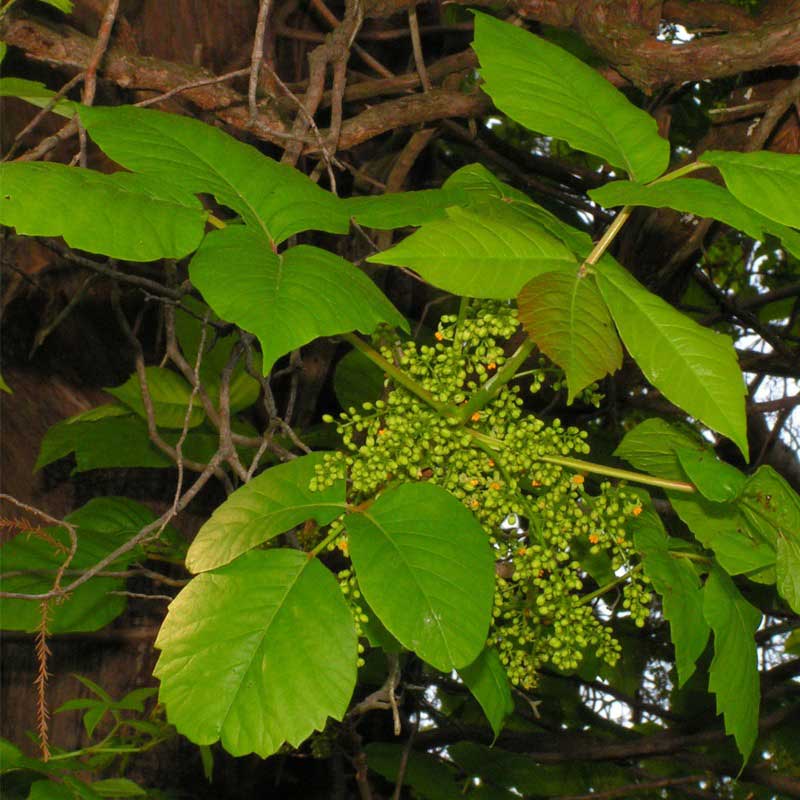Spring has sprung and that means the trees and plants will be starting to green-up soon. Here in the Garden State, we pride ourselves on the beauty of our flowers, trees, and gardens. But, among all the beauty of spring lurk unsuspecting plants that can cause you some real pain if you aren’t careful. I’m talking about the most common poisonous plants found in New Jersey. The big 3: Poison oak, poison ivy, and poison sumac. These plants can be hiding anywhere on your property and the best way to avoid them is to know what they look like.
 Poison Ivy
Poison Ivy
We’ve all heard of poison ivy and we are always scared of getting it when we go traipsing off into the woods. But how many of us really know how to spot poison ivy? Poison Ivy is covered in a substance called Urushiol which causes severe allergic reactions in the form of itchy rashes all over the body. The severity depends on the amount of exposure one has to the oil.
Identifying Poison Ivy
If you’ve ever heard your grandma warn you, “leaves of three, let it be” then you are on the right track. In fact, if you just avoid any plant that has three leaves you’ll be able to avoid two poisonous plants on this list. Poison ivy leaves can range from green to orange or reddish-purple. They usually grow in the form of a vine that snakes its way up trees but it can also grow on the ground in a shrub form. Poison ivy has small red hairs on their stems, not thorns.
It is imperative to understand just how potent Urushiol is. Many people get rashes from poison ivy without ever having touched the plant. Rather, they get it from something else that’s touched this poisonous plant such as a log, a pet, or clothing.
If you are working in an area with excessive brush or you are cutting down a tree that is covered in vines, take extra precautions. Always wear long pants, long sleeves, and gloves. After your chores are done wash all clothes and shower immediately. Urushiol can linger on your skin for quite some time before it causes a reaction so it’s best to eliminate it instead of spread it.
NEVER EVER burn poison ivy or anything that has touched poison ivy.
 Poison Oak
Poison Oak
Often confused for poison ivy but just as serious, is poison oak. Poison oak also bears leaves of three but its leaves are more serrated like an oak leaf which it is also often mistaken for.
How to identify poison oak from the surrounding brush?
- Usually has 3 leaves.
- The leaves are more notched than poison ivy.
- Small hairs on both sides of the leaves.
Never remove this plant by hand. Some of us have found that out the hard way. Always use herbicides like Round-Up, to eliminate these plants to ensure your protection and to prevent them from growing back.
Poison Sumac
The strange cousin to poison oak and ivy, poison sumac is definitely the more formidable of the 3 most common poisonous plants found in New Jersey. Although not as common as the other two, sumac tends to live in wet marshy areas where it grows in the form of a tree, making it especially difficult to identify.
Identifying Poison Sumac
The stem of the poison sumac tree tends to have seven to thirteen leaves much like elm or a walnut tree, but you’ll know the real difference if you have the misfortune of brushing up against it. Poison sumac is easier to I.D. in the fall when its leaves change to bright yellow, red, and pink with little yellow berries. Removal of this plant should be done only by professionals as it can only be dug up. Leaving any part of the root system intact will allow it to re-grow.
Take Precautions
These three poisonous plants should be taken very seriously. The severity of the reaction depends on the person. Some get it mildly, while others can get it so bad it covers them from head to toe, even getting down their throats. When working outdoors always wear proper attire. If you are going into an unfamiliar wooded area, always cover your arms and legs and always be on the lookout.
Get Professional Help
If you have any of these poisonous plants or just want to get rid of some unsightly weeds call Elements Lawn and Pest today.
Just call (856) 375-1340 or leave us a message.

